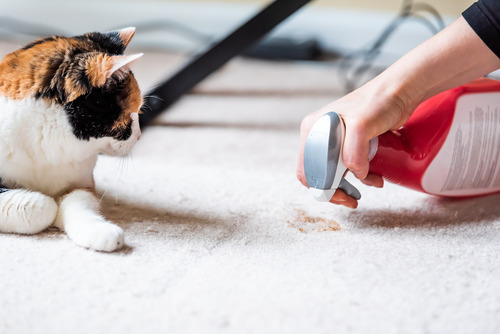If your cat is throwing up food, it can be distressing for both you and your pet. Vomiting is a common issue in cats and can stem from various causes. Understanding why your cat is experiencing this problem is essential for addressing it effectively. In this blog, we’ll explore the potential reasons for a cat throwing up food, the importance of identifying the underlying cause, and when you should seek professional veterinary help. Call Boulder Veterinary Hospital at (303) 442-6262 or book an appointment online if you have concerns about your cat’s health.
Common Causes of Cats Throwing Up Food
Cats can throw up food for several reasons, ranging from benign to serious medical conditions. It’s crucial to observe your cat’s behavior and symptoms to pinpoint the cause. Here are some common reasons why your cat might be vomiting food:
Eating Too Quickly
Many cats eat their food too quickly, leading to regurgitation shortly after. When a cat eats rapidly, they might not chew their food properly, causing it to come back up. This is particularly common in multi-cat households where competition for food exists.
Dietary Changes
Switching your cat’s diet abruptly can upset their stomach, leading to vomiting. Cats have sensitive digestive systems, and sudden changes in their food can cause gastrointestinal distress. It’s essential to transition to new food gradually.
Food Allergies or Intolerances
Some cats develop allergies or intolerances to certain ingredients in their food. If your cat is vomiting after meals, it could be a sign of an adverse reaction to their diet. Identifying and eliminating the offending ingredient can help alleviate this issue.
Hairballs
Cats groom themselves regularly, and in the process, they ingest hair. Hairballs are a common cause of vomiting in cats. While occasional hairballs are normal, frequent hairball-related vomiting may indicate an underlying problem.
Ingesting Foreign Objects
Cats are curious creatures and sometimes ingest foreign objects, such as strings, rubber bands, or small toys. These objects can cause blockages in the digestive tract, leading to vomiting. If you suspect your cat has ingested a foreign object, seek veterinary attention immediately.
Medical Conditions Leading to Vomiting
Vomiting can also be a symptom of various medical conditions. If your cat is frequently throwing up food, it’s essential to consider the following potential health issues:
Gastrointestinal Disorders
Conditions such as gastritis, inflammatory bowel disease (IBD), and pancreatitis can cause vomiting in cats. These disorders affect the digestive system and require a veterinary diagnosis and treatment plan.
Kidney Disease
Chronic kidney disease is common in older cats and can lead to vomiting. The kidneys play a crucial role in filtering toxins from the body, and when they fail to function correctly, it can result in gastrointestinal symptoms.
Liver Disease
Liver disease can also cause vomiting in cats. The liver is responsible for detoxifying the body, and liver dysfunction can lead to a buildup of toxins, causing nausea and vomiting.
Hyperthyroidism
Hyperthyroidism, a condition where the thyroid gland produces excess hormones, can cause vomiting. Cats with hyperthyroidism often have increased appetite and weight loss in addition to gastrointestinal symptoms.
Diagnosing the Cause of Vomiting
Determining the cause of your cat’s vomiting is essential for effective treatment. A thorough veterinary examination is necessary to diagnose the underlying issue. Here’s what you can expect during a veterinary visit:
Medical History and Physical Examination
Your veterinarian will take a detailed medical history, including any recent dietary changes, symptoms, and behavior. A physical examination will help identify any palpable abnormalities or signs of illness.
Diagnostic Tests
To pinpoint the cause of vomiting, your veterinarian may recommend diagnostic tests such as blood work, urinalysis, fecal examination, and imaging studies like X-rays or ultrasound. These tests provide valuable information about your cat’s overall health and specific conditions.
Treatment Options for Cats Throwing Up Food
The treatment for a cat throwing up food depends on the underlying cause. Here are some potential treatment options your veterinarian may suggest:
Dietary Modifications
If dietary issues are the culprit, your veterinarian may recommend switching to a hypoallergenic or easily digestible diet. Gradual dietary changes can help prevent gastrointestinal upset.
Medications
For cats with medical conditions such as IBD or hyperthyroidism, medications can help manage symptoms and improve quality of life. Your veterinarian will prescribe the appropriate medications based on the diagnosis.
Hydration and Supportive Care
Vomiting can lead to dehydration, so it’s essential to ensure your cat stays hydrated. Your veterinarian may administer subcutaneous fluids and provide supportive care to help your cat recover.
Preventing Future Episodes of Vomiting
Preventing future episodes of vomiting involves addressing the root cause and making necessary adjustments to your cat’s care routine. Here are some tips to help keep your cat healthy:
- If your cat eats too quickly, consider using a slow feeder or puzzle feeder to slow down their eating pace. This can help reduce the likelihood of regurgitation.
- When introducing new food, do so gradually over a week or more. Mix a small amount of the new food with the current diet and gradually increase the proportion of the new food.
- Routine veterinary check-ups are crucial for monitoring your cat’s health and catching potential issues early. Regular exams can help detect and address underlying conditions before they become serious.
When to Contact Boulder Veterinary Hospital
Understanding why your cat is throwing up food is the first step in addressing the problem. While occasional vomiting might not be a cause for alarm, frequent or severe vomiting requires professional attention. If your cat is throwing up food regularly, showing signs of lethargy, weight loss, or other concerning symptoms, it’s time to consult with a veterinarian. At Boulder Veterinary Hospital, we are here to help diagnose and treat your cat’s health issues. Call us at (303) 442-6262 or book an appointment online to ensure your cat receives the best care.





